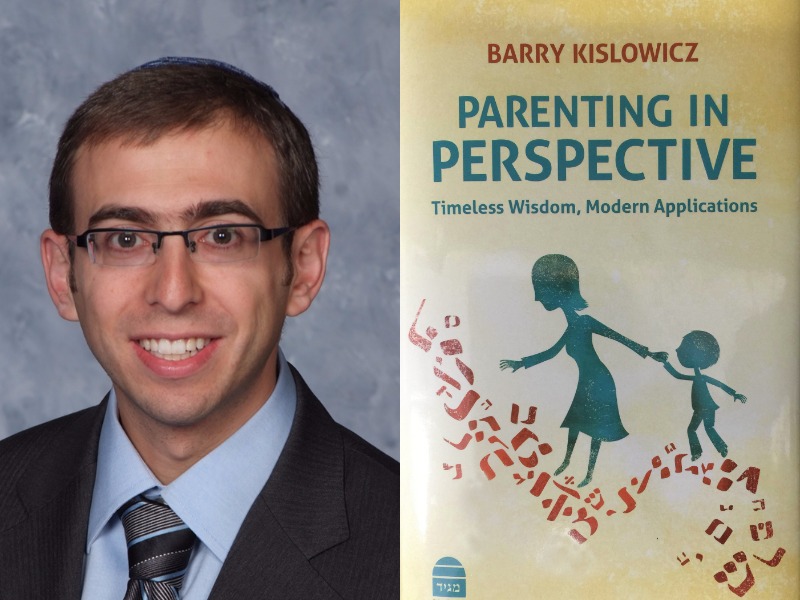An excerpt from Parenting in Perspective: Timeless Wisdom, Modern Applications by Rabbi Barry Kislowicz
Some families are blessed with child after child who makes them proud. Others seem to struggle with their children at every turn. What separates the one from the other? Genetics? Providence? Dumb luck?
There is one in every community. That family you see in the hallways at school or in the checkout line at the supermarket. We will call ours the Abram family.
David Abram is a successful lawyer who is a partner in a small firm in town. Sara Abram is an occupational therapist working at a seniors living facility. They have both volunteered at the shul and JCC, and Mr. Abram is currently the school board’s treasurer. All in all, they are similar to most of the families in your community. Yet somehow, while most of us are struggling with our kids, they turn out child after child who is the envy of the community.
READ: REMEMBERING WHAT EDUCATION IS ALL ABOUT
It’s not that their kids are brilliant, or that they are the stars of every varsity team. It’s that everyone knows the Abram kids are good kids. They are the kids who will say good morning to you or offer to help you with whatever you are doing. They are the kids who enjoy sitting next to their parents in synagogue. They are the kids who seem to have forgotten about the teenage rebellion stage that your kids are putting you through right now.
Mr. Smithson, the school maintenance man, pulled Mrs. Abram aside at pickup time one afternoon to talk about her middle school son. Mr. Smithson does not typically conduct parent-teacher conferences, so the meeting caused a few inquisitive heads to turn. The story? Earlier that day, a middle school student had spilled his bag of chips in the hallway. Like any normal middle schooler, he kept right on walking. The other students he was with kept walking, too. Except one. Jonny Abram stopped in the middle of the hallway to pick up the chips. He was still there when maintenance arrived to sweep up the spill, and Jonny kept right on helping.
No one is quite sure how the Abrams do it. Especially that other family down the road. We’ll call them the Steins. Dan Stein owns a growing medical practice in town. He is deeply involved in the community and is the president of the local shul. Debbie Stein is an associate at a marketing firm. The Steins are a typical family in the community, and their children are somewhat typical as well.
Rachel, the Stein’s 12-year-old, just had her bat mitzvah. She dutifully worked with her tutor to prepare a speech about being kind to others, and she put some effort into the project she had chosen: knitting scarves to donate to a local men’s shelter. When the time finally came to celebrate, Rachel read her speech beautifully.
The Steins wanted to feel only pride in their daughter. They could not help noticing, though, that while Rachel prepared a wonderful speech about kindness, the lesson seemed to have disappeared when it came time to invite all the girls in her class to her bat mitzvah. It took the Steins days of fighting to convince their daughter not to exclude anyone. But once all the girls were at the party, Rachel had found a way to arrange the table so that only her own clique had any chance of talking to her.
Routine 12-year-old behaviour? Absolutely. But the Steins had hoped for so much more from their daughter on her big day. The Steins ended the bat mitzvah as they ended too many days with their children, wondering if all parents feel quite like this.
Both the Steins and the Abrams love their children, and both believe that their children are at the centre of the family’s life. The key distinction between the two is how they understand what it means to truly put children at the centre.
What the Abrams understand, and what the Steins unfortunately miss, is that all that we pour into our children will fall flat if we make the mistake of seeing them as passive objects at the centre of our lives.
READ: WHEN IT COMES TO ENROLLING KIDS IN JEWISH PROGRAMS, PARENTS MORE LIKELY TO SAY ‘MAYBE’
To place children at the centre in a meaningful way, we must view them not as objects in our lives but as the subjects of their own. Our role is not to offer instruction and criticism to the lead actors until they get the scene right. The successful parent is more stagehand than director, understanding that the task is to carefully construct the environments and relationships of which their child is the centre.
The Abrams see their children as independent individuals who are the central actors in their own lives. Lives which they are privileged to support, inspire and sustain as their parents, but lives which, in the final analysis, are fundamentally independent. They realize that they cannot simply direct or control their children. Rather, they must understand who their children are today so that they enable them to grow toward the future. This fundamental understanding guides parenting decisions ranging from bar mitzvah planning to school choices.
It is what sets families like the Abrams apart and allows their children to flourish.
Adapted from Parenting in Perspective: Timeless Wisdom, Modern Applications by Rabbi Barry Kislowicz, published by Maggid Books.
Rabbi Barry Kislowicz has spent the last decade serving the Jewish community in Cleveland, Ohio, as the head of Fuchs Mizrachi School. He holds rabbinic ordination from Yeshiva University and a doctorate in education from Columbia University Teachers College.
